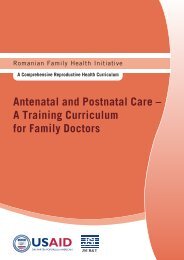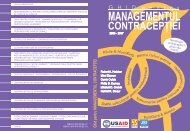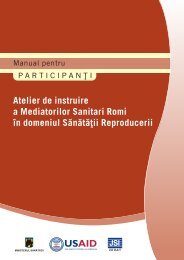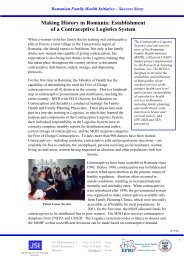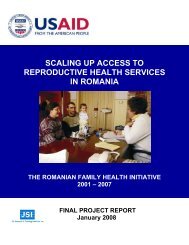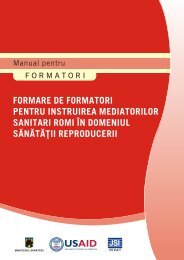Training of Roma Health Mediators in Reproductive Health
Training of Roma Health Mediators in Reproductive Health
Training of Roma Health Mediators in Reproductive Health
Create successful ePaper yourself
Turn your PDF publications into a flip-book with our unique Google optimized e-Paper software.
sick and spread to others.<br />
‣ How can a person avoid gett<strong>in</strong>g a STI?<br />
He/she doesn’t have sex.<br />
Expla<strong>in</strong> that most <strong>of</strong> the people choose to have sex. In this case:<br />
‣ How can sexually active people significantly reduce the risk <strong>of</strong> STIs?<br />
• Use condoms every time they have sex<br />
• Have sex with only one person who is disease free and who has sex only with<br />
him/her (be faithful)<br />
• Do not have sex if he/she or his/her partner has an <strong>in</strong>fection <strong>in</strong> the reproductive<br />
system. Wait until after the <strong>in</strong>fection has been fully treated<br />
• Do not use unclean <strong>in</strong>jection needles or have sex with someone who uses them.<br />
‣ What other ways can sexually active people reduce the risk <strong>of</strong> STIs?<br />
• Reduce the number <strong>of</strong> sexual partners<br />
• F<strong>in</strong>d ways to be sexual that do not <strong>in</strong>clude penetrative sex<br />
• Communicate with their partners about STIs and the risk <strong>of</strong> <strong>in</strong>fection<br />
• Discuss with partner(s) about past sexual partners, needle drug use, and untested<br />
transfusions<br />
• Get regular checkups<br />
• Monitor their bodies for signs <strong>of</strong> <strong>in</strong>fection or for changes<br />
• See a health pr<strong>of</strong>essional if they notice a change that is not typical, or if they th<strong>in</strong>k<br />
they may have been <strong>in</strong>fected with a STI<br />
• Do not abuse drugs or alcohol. These substances can cloud the judgment and<br />
make it harder to protect reproductive health<br />
• Make sure blood has been screened for disease before receiv<strong>in</strong>g a transfusion<br />
• Believe they have the right to keep themselves healthy.<br />
‣ Why is it important to detect early and to treat <strong>in</strong>fections?<br />
Without treatment, STIs can lead to serious complications such as:<br />
• Infertility <strong>in</strong> men and women<br />
• Eight to ten times <strong>in</strong>creased risk <strong>of</strong> gett<strong>in</strong>g HIV/AIDS, if exposed to a STI<br />
• Increased risk <strong>of</strong> cervical cancer<br />
• Risky pregnancy, e.g., miscarriage, still births or <strong>in</strong>fants born with birth defects,<br />
<strong>in</strong>clud<strong>in</strong>g bra<strong>in</strong> damage<br />
• Dur<strong>in</strong>g birth, the newborn can get severe eye <strong>in</strong>fection from mother’s birth-canal<br />
and can become bl<strong>in</strong>d.<br />
167<br />
RFHI/JSI <strong>Roma</strong>nia <strong>Tra<strong>in</strong><strong>in</strong>g</strong> <strong>of</strong> RHMs <strong>in</strong> <strong>Reproductive</strong> <strong>Health</strong> Session 10: STIs



